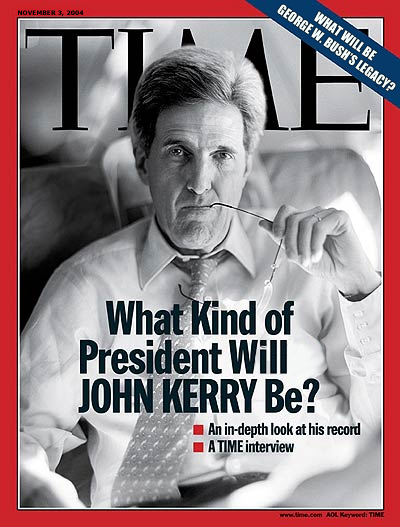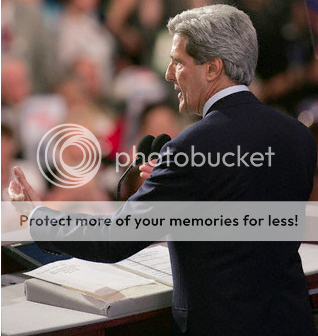The motorcade made its way to Capitol Hill. Beside President-Elect Kerry was the outgoing President, George Walker Bush. The man had had a difficult four years in office and would leave office moderately popular. He was no Abraham Lincoln, but his legacy would be far better than those of James Buchanan and Warren Harding. The temperature outside of the vehicle was frigid and there was fresh snow on the ground. It was January 20th and John Forbes Kerry was preparing to become the 44th President of the United States. He was confident in his inaugural address, confident in his ability to recite the oath, and confident about the evening's activities. What he was unsure about was what the next four, and perhaps eight, years would have in store for him.
As the limousine approached the back of the Capitol Building, Kerry and Bush exited the car. "Mr. President, if you'll follow me," and usher said.
A woman standing beside Bush's usher spoke to Kerry. "And Mr. President-Elect, if you'll follow me."
This was where their paths would diverge. Bush extended his hand and shook Kerry's. "Congratulations, Mr. President," he said.
Kerry returned the handshake and smile, "Thank you, Mr. President."
With that the two went in opposite directions. Bush walked to his seat on the podium and met with his wife Laura on the way. It was a rough day. In 1992, when the President's father lost reelection, it was a particularly ugly time for the Bush family. The elder Bush was beside himself, flabbergasted by the fact the nation had chosen someone over him. It was a rough time for little George, watching his father go through the agony of defeat. Now, Bush was preparing to leave office a defeated ex-President as well. Still, Bush felt no hatred towards Kerry, Kerry deserved the benefit of the doubt and Bush vowed not to be an overly-critical ex-President. There was something called the President's Club and it was Bush's duty to honor that code of respect, even if Bill Clinton hadn't been the easiest footsteps to follow in.
Kerry followed his usher to the inside of the Capitol Building. He paced, nervous about what was next for him. His attitude had changed drastically since he and Bush had driven to the Inauguration together. Then, it was coming; now, it was nerve-racking. He turned and saw the Vice President-Elect, John Edwards. The two shook hands and exchanged a few words before John and his wife Elizabeth were called to the reviewing stand. Minutes later, Kerry and his wife Theresa exchanged their last moments as Theresa left to join Elizabeth, the two would walk out together. After that, Johnny Reid Edwards, Vice-President-Elect walked onto the stand. Moments later, after outgoing President George Bush was on stage, Kerry was called out.
The band boomed and Kerry worked the edges of the aisle, shaking hands and greeting dignitaries. The first to be sworn in, after the musical performances and glad-handing, was John Edwards. Justice John Paul Stevens administered the Oath of Office as Edwards replaced Dick Cheney as Vice President. It was a momentous occasion for Edwards, especially because his career was only seen as going up. If Kerry served eight years, as most people assumed he would after just having a one-term President, Edwards would be the prohibitive front runner for the 2012 Democratic Nomination, despite the fact that Hillary Clinton already seemed to be bracing herself for a future in national politics. That didn't matter now, though, because Hillary stood behind her husband, the former President, and watched as Johnny Reid Edwards became the nation's 47th Vice President. And then the moment everyone had waited for. Introduced by House Minority Leader Nancy Pelosi, Kerry was called to the podium as was Chief Justice William Rehnquist for the oath.
"Mr. President-Elect, please repeat after me," Rehnquist instructed. "I, John Forbes Kerry, do solemnly swear..."
Kerry took the deepest of breaths, "I, John Forbes Kerry, do solemnly swear..."
"...that I will faithfully execute the office of President of the United States..."
"...that I will faithfully execute the office of President of the United States..."
"...and will to the best of my ability preserve, protect, and defend the Constitution of the United States."
John Kerry was a man that had seen the most gruesome aspects of combat during the Vietnam War, but this moment was more humbling than anything he had ever experienced the nation looked to him as he began to end of the oath, "...and will to the best of my ability preserve, protect, and defend the Constitution of the United States."
"So help you God?"
"So help me God!"
That was it. The 35 words were over and John Kerry was now President John Kerry. The nation had a new President and the people below the West Front of the U.S. Capitol Building erupted into fervent applause. Kerry waved and turned to shake several hands, including the now former President George W. Bush, and then returned to the podium to address an anxious nation. The sun was bright, the wind harsh, and the people below eager. With that, the new President began his remarks:
"Vice President Edwards, Mr. Chief Justice, President Carter, President Bush, President Clinton, President Bush, reverend clergy, distinguished guests, my fellow Americans:
"Today marks an end as well as a beginning. Today marks, once again, the peaceful transition of power from one president to the next. From one administration and one vision to a new administration with its own vision. Today marks one of the greatest aspects of American democracy and of our nation as a whole. For the peaceful transition of power is a cornerstone, the very foundation, of our electoral system. And though, on the campaign trail, we had our differences, I am proud to take the Oath of Office today and to stand here as your President.
"I want to thank President Bush for all he did for our nation. His four years were not easy, and he led our nation during one of the most difficult parts of our nation's history, for that he will always have my thanks and our entire country's admiration.
"And while today marks the end of his presidency and the start of mine, it does not mean the absolute dissolution of our problems. The issues that our nation faces still exist - from two wars to poverty to partisan divide - the problems staring-down our country remain. While these problems are large and may certainly seem immovable, they are not invincible, and while they do not offer an easy way out that does not mean I shrink from the responsibilities prescribed to me."
Kerry's address continued, outlining what he felt the nation faced and how he planned to get the nation there. John Edwards, George W. Bush, and others looked on as the new President took his time - clearly articulating his message. He did well and the speech, despite its length, was successful, a great start for a new President who hoped to make a firm first impression. Upon the conclusion of the address Kerry and others left the stand and Theresa Heinz Kerry, the new first lady, and John Kerry, the new President, escorted George and Laura Bush to a waiting Marine One, which would take them to Air Force One, which would eventually bring them to Crawford, Texas: home. Just outside the roaring propellers of the helicopter, the Kerry's and the Bush's extended hugs and bids of good luck. Bush and Kerry embraced, signaling the potential for cooperation in the future. Despite a hard and bitter campaign, the two men were cordial and polite. It was a moment to remember - a moment, as Kerry said, that marked one end and another beginning.





